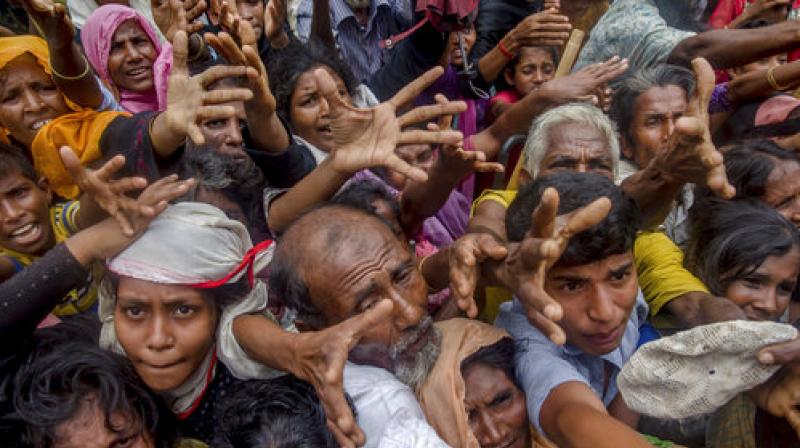UN condemns violence in Myanamr which forced over 600,000 Rohingyas to flee
The presidential statement calls on Myanmar's govt to ensure no further excessive use of military force in Rakhine State'.

United Nations: The UN Security Council unanimously approved a statement on Monday strongly condemning the violence that has caused more than 600,000 Rohingya Muslims to flee from Myanmar to Bangladesh, a significant step that still fell short of a stronger resolution that Western nations wanted but China opposed.
The presidential statement calls on Myanmar’s government “to ensure no further excessive use of military force in Rakhine State” and take immediate steps to respect human rights. It expresses “grave concern” at reports of human rights violations in Rakhine by Myanmar’s security forces against the Rohingya. These include “the systematic use of force and intimidation, killing of men, women and children, sexual violence and … the destruction and burning of homes and property,” it says.
Britain initially circulated a Security Council resolution with similar language, backed by the US, France and other council members. But resolutions are legally binding and diplomats said China, a neighbor and ally of Myanmar, was strongly opposed. China is one of the five countries that have veto power on the council. So Britain and France turned the resolution into a presidential statement, which becomes part of the council’s record but does not have the legal clout of a resolution.
Nonetheless, the statement still represents the strongest council pronouncement on Myanmar in nearly 10 years, and reflects widespread international concern at the plight of the Rohingya, who face official and social discrimination in Buddhist-majority Myanmar.
French Ambassador Francois Delattre said the Security Council sent “a strong and unanimous message to end the ethnic cleansing that is taking place before our eyes in Myanmar and recreate the political momentum in this country.” Britain’s deputy UN ambassador, Jonathan Allen, called it “a first step” and said the council will judge Myanmar “on how they act.” Both Delattre and Allen decried the desperate humanitarian situation for the Rohingya, with the French ambassador calling it “one of the worst humanitarian crises of our time.”
The council statement “expresses alarm at the significantly and rapidly deteriorating humanitarian situation in Rakhine state” and demands that the government grant “immediate, safe and unhindered access to United Nations agencies and their partners” and other aid organizations.
On Oct. 27, the UN World Food Program said it had gotten a “green light” to resume full operations in northern Rakhine State and was working out the details. But the agency’s executive director, David Beasley, said in an interview late Monday with The Associated Press that “we’re in the infant stages of negotiating working with the government of Myanmar to re-enter strategically where we need to be to help innocent people.” “We’re hopeful the Myanmar government will give us the access we need,” said Beasley, who recently visited Rohingya refugees in Bangladesh. “That situation is catastrophic. … I’ve never seen anything like it.”
Myanmar’s government doesn’t recognize the Rohingya as an ethnic group, insisting they are Bengali migrants from Bangladesh living illegally in the country. It has denied them citizenship. The latest violence began with a series of attacks Aug. 25 by Rohingya insurgents, which the presidential statement also condemns. Myanmar security forces responded with a scorched-earth campaign against Rohingya villages in northern Rakhine that the United Nations and human rights groups have criticized as disproportionate and a campaign of ethnic cleansing.
The statement adopted Monday calls on Myanmar’s government to protect human rights, “without discrimination and regardless of ethnicity or religion, including by allowing freedom of movement, equal access to basic services and equal access to full citizenship for all individuals.” It urges the government to work with Bangladesh and the UN “to allow the voluntary return of all refugees in conditions of safety and dignity to their homes in Myanmar.” It also stresses the importance of holding those responsible for human rights violations accountable.
Myanmar’s ambassador, Hau Do Suan, expressed deep concern at the statement, saying it was “based on accusations and falsely claimed evidence.” “It exerts undue political pressure on Myanmar,” Suan said. “It fails to give sufficient recognition to the government of Myanmar for its efforts to address the challenges in Rakhine State.”
By contrast, Bangladeshi Ambassador Masud Bin Momen thanked the council for the statement, saying: “It will be quite reassuring for the Rohingyas and other communities forcibly displaced from northern Rakhine State since Aug. 25 that the council remains engaged with their prolonged suffering, insecurity and uncertainty.”

